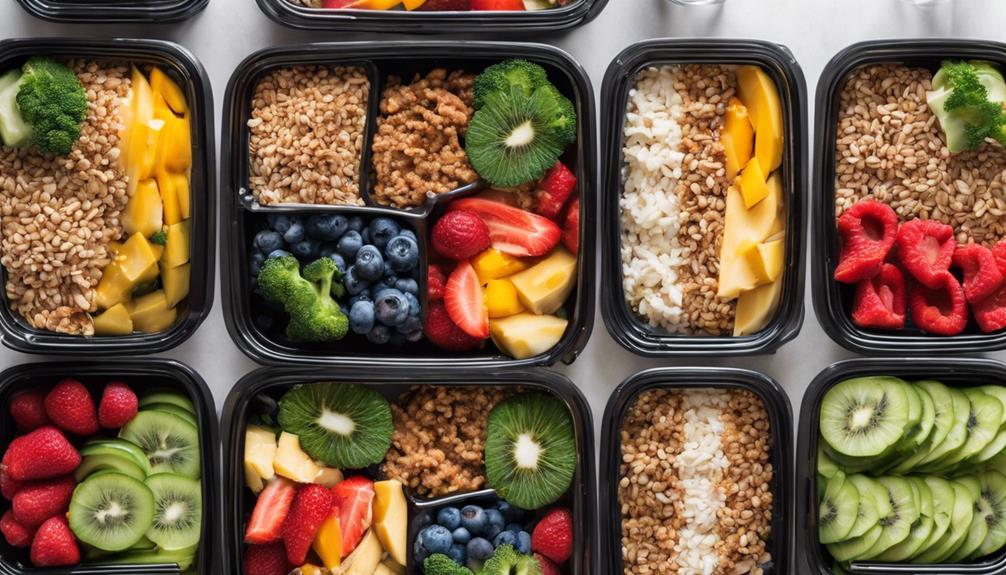As a team of healthcare professionals, we recently worked with a new mother who struggled to maintain her energy levels while breastfeeding. She found that by incorporating more nutrient-dense foods into her diet, she not only felt more energized but also noticed an increase in her milk supply.
Curious to know how simple dietary adjustments can make a significant impact on your breastfeeding journey? Stay tuned as we explore practical meal planning tips, hydration strategies, and essential nutrients that can benefit both you and your little one.
Key Takeaways
- Ensure intake of calcium, iron, vitamin D, and omega-3 for overall health.
- Plan meals with lean protein, whole grains, healthy fats, and colorful fruits/vegetables.
- Stay hydrated with at least 8 cups of water daily; monitor urine color.
- Manage alcohol and caffeine intake responsibly; consider baby's sleep and health.

Legendairy Milk Liquid Gold Lactation Support | Lactation Supplement with Organic Goats Rue, Milk Thistle, Shatavari, Fennel, Alfalfa & Anise | Breastfeeding Supplements, 60 Count
𝐒𝐓𝐄𝐏 𝐔𝐏 𝐘𝐎𝐔𝐑 𝐋𝐀𝐂𝐓𝐀𝐓𝐈𝐎𝐍 𝐆𝐀𝐌𝐄 – Liquid Gold is a powerful blend of 6 certified organic ingredients well-known…
As an affiliate, we earn on qualifying purchases.
As an affiliate, we earn on qualifying purchases.
Essential Nutrients for Breastfeeding Moms
Breastfeeding moms require a variety of essential nutrients to maintain their own health and support excellent milk production for their babies. Key nutrients such as calcium, iron, vitamin D, and omega-3 fatty acids play important roles during this period.
Calcium is important for bone health, iron for sustained energy levels, vitamin D for immune function, and omega-3 for brain development in both mom and baby. Including colorful fruits and vegetables in the diet not only provides essential antioxidants but also supports overall well-being during breastfeeding.
Lean protein, whole grains, and healthy fats are essential components of a balanced diet for nursing mothers. Prioritizing these nutrient-dense foods will optimize the nutritional quality of breast milk, ensuring the health of both the mother and the baby.

Nature Made Postnatal Multivitamin + DHA 200 mg, Postnatal Vitamins for Women, Includes Iron, Vitamin D3, Calcium, Iodine & More for Breastfeeding Moms, 60 Softgels
60-DAY SUPPLY, ONE DAILY SOFTGEL: Adults take 1 softgel daily with water and a meal. Each serving (1…
As an affiliate, we earn on qualifying purchases.
As an affiliate, we earn on qualifying purchases.
Meal Planning Tips for Nursing Moms

Planning nutritious meals and snacks is essential for nursing moms to meet their increased caloric and nutrient requirements effectively. When considering your diet as a breastfeeding mother, aim to include a variety of nutrient-dense foods to support both you and your baby.
Lean protein sources like poultry, fish, eggs, and legumes are vital for muscle repair and growth, aiding in your postpartum recovery. Incorporating whole grains such as quinoa, brown rice, and whole wheat bread can provide sustained energy levels throughout the day, helping you keep up with the demands of caring for your little one.
Don't forget to include healthy fats like avocados, nuts, seeds, and olive oil in your meals; they support brain development in infants and hormone production in mothers. Additionally, colorful fruits and vegetables should be a staple in your diet to supply essential vitamins, minerals, and antioxidants for overall health and immune support.
Prioritizing these nutrient-rich foods will help you maintain a healthy breast milk supply while meeting your own nutritional needs.

New Chapter Wholemega for Moms Fish Oil Supplement, Tiny Capsules, 2000mg per Serving, Prenatal DHA with Omega-3 + Vitamin D3 for Prenatal & Postnatal Support, 500mg Each – 180 Count
WILD-CAUGHT ALASKAN SALMON OIL: Our whole fish oil delivers 935 mg of Omegas including prenatal DHA and other…
As an affiliate, we earn on qualifying purchases.
As an affiliate, we earn on qualifying purchases.
Hydration Strategies for Breastfeeding
To guarantee peak hydration levels for nursing mothers and support milk production, maintaining a daily intake of at least 8 cups of water is essential. Adequate fluid intake, around 128 ounces per day from various sources, plays an important role in postpartum recovery and overall well-being for breastfeeding women. Dehydration can lead to health complications such as urinary tract infections (UTIs) and fatigue, underscoring the significance of staying hydrated during this critical time. A simple way to monitor hydration status is by observing urine color, aiming for clear or light yellow urine as a sign of proper hydration.
For best hydration, it's important for breastfeeding moms to drink water whenever they feel thirsty and to steer clear of sugary drinks that can deplete rather than replenish fluids. By focusing on water intake and avoiding sugary beverages, breastfeeding mothers can effectively maintain their hydration levels, supporting both their own health and the quality of breast milk for their little ones.

momjug Hydration Water Bottle for Moms 50oz (With Indicator, Pink)
Reusable
As an affiliate, we earn on qualifying purchases.
As an affiliate, we earn on qualifying purchases.
Alcohol and Caffeine Guidelines

Ensuring responsible consumption of alcohol and caffeine is essential for maintaining a healthy breastfeeding environment for both mother and baby. When it comes to alcohol, waiting 2-3 hours after consumption before breastfeeding or pumping helps decrease alcohol levels in breast milk. This precaution is vital as alcohol leaves breast milk as blood alcohol levels decrease, potentially affecting the baby's well-being.
On the other hand, caffeine can also transfer to breast milk, impacting some babies' sleep patterns. To mitigate this, it's advisable to limit caffeine intake to 2-3 cups per day while breastfeeding, or avoid it altogether if necessary. By following these alcohol and caffeine guidelines, mothers can create a nurturing breastfeeding environment that supports the health and well-being of both themselves and their babies.
- Wait 2-3 hours after alcohol consumption before breastfeeding/pumping.
- Limit caffeine intake to 2-3 cups per day while breastfeeding.
- Be mindful of how alcohol leaves breast milk as blood alcohol levels decrease.
- Consider avoiding caffeine if it impacts your baby's sleep patterns.
- Following alcohol and caffeine guidelines promotes a healthy breastfeeding environment.
Managing Allergies in Breastfed Babies
After addressing alcohol and caffeine guidelines for breastfeeding moms, understanding and managing allergies in breastfed babies is essential for guaranteeing the well-being of both mother and child.
Breastfed babies can develop allergies to common allergens such as dairy, soy, wheat, and eggs. Less common allergens for breastfed babies include fish, nuts, peanuts, or corn. Keeping a detailed food diary can assist in identifying problematic foods that may be causing allergic reactions in infants.
If allergic reactions are suspected, eliminating suspected allergens from the mother's diet could help alleviate allergy symptoms in breastfed babies. It's critical to consult healthcare providers for guidance on managing and identifying allergies in breastfed infants.
Frequently Asked Questions
What Is a Balanced Diet for Breastfeeding Mothers?
We guarantee a balanced diet for breastfeeding by incorporating nutrient-rich foods like proteins, fruits, veggies, and whole grains. Hydration is key. Focus on iron, calcium, vitamins, omega-3s. Avoid excess caffeine, alcohol. Consult a healthcare provider for personalized advice.
What Are the Guidelines for a Healthy Diet When Breastfeeding?
We nourish ourselves like a garden, focusing on protein-rich foods, whole grains, fruits, vegetables, and ample hydration. Our diet includes lean meat, eggs, dairy, beans, seafood, and 8 cups of water daily, meeting nutrient needs for breastfeeding.
How Do I Plan a Diet for a Lactating Mother?
We plan a diet for a lactating mother by incorporating nutrient-dense foods like lean proteins, whole grains, fruits, and vegetables. Hydration is key, so we aim for at least 8 cups of water daily. Consulting a healthcare provider guarantees a personalized and supportive plan.
What Are the Dietary Guidelines for Breastfeeding Mothers?
We consume extra 500-600 calories daily for milk production. Our diet includes protein-rich foods like meat, dairy, and beans. We aim for three veggie servings, two fruits, and whole grains like oatmeal for energy and satiety.
Conclusion
To sum up, maintaining a healthy diet while breastfeeding is essential for both mother and baby's well-being. By focusing on nutrient-rich foods, staying hydrated, and following guidelines for alcohol and caffeine intake, nursing moms can support milk production and overall health.
Remember, a balanced diet is key to providing the best nutrition for your little one. So, keep nourishing yourself and your baby with love and care – you're doing an amazing job!









